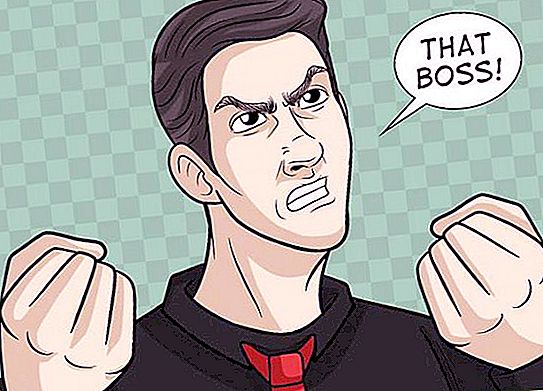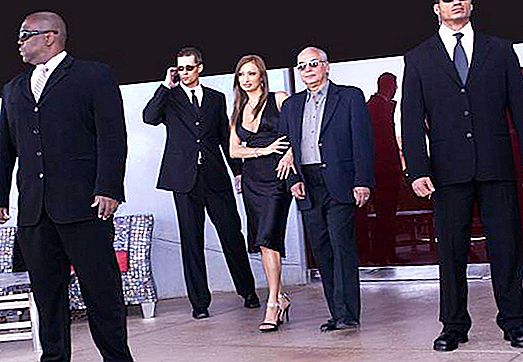Video: How to answer tell me about a time | BEST Behavioral Interview question answers 2024, July
An interview with the leader is one of the most important stages in the employment for a particular position. It often happens that untrained people fail the survey or do not behave quite correctly, which is why they are not hired. So how is it worth behaving properly and what to answer at the interview? Let's get it right.

5 major mistakes
First of all, it’s worth starting with 5 basic mistakes made by almost all candidates during an interview with a manager. At first glance, these things may not seem so significant, but in the end they play a rather important role.
Calm, only calm
The first and most common mistake in any interview with a leader is agitation. In general, worrying for a person in certain situations is quite normal, but not in this case. Unrest is one of the most dangerous enemies in any job interview. Even if the completed questionnaire and a rich resume are on the side of the applicant, then insecurity, trembling voices, sweat, rolling eyes, etc., will obviously not benefit the candidate.

Here is a simple example of how to behave in an interview when applying for a job. The voice is clear and confident, the look is concentrated, the behavior is calm, hands do not "dance" around, but the most important thing is the lack of fear. If you adhere to this behavior, then there will be no excitement. As for the feeling of fear, then everything is simple. Do not be afraid that the person who accepts you for an interview occupies a leadership position, because first of all he is the same person as you. We don’t have a feeling of fear in stores before sellers, before bank employees or in cafes before waiters, so why should a manager be afraid?
And one more rather important point. Before an interview, some people come up with a “terrific” thought, which is supposedly designed to help with excitement and worry - a sedative reception. Doing this is highly discouraged. The head and mind should be extremely clear in order to clearly receive all the information and competently answer questions, and sedatives do not allow this to be done in full.
I know everything, I can do everything
The second most common mistake in an interview with a leader is excessive self-confidence and ability. It would seem that this could be bad? Everything is simple. A candidate who is too self-confident, as a rule, makes slightly exaggerated demands, for example, a salary of not 30,000 rubles, but 60,000. Of course, there is nothing wrong with such a desire, but if we are talking about a specific vacancy with specific conditions, then demand more especially at the stage of negotiations, just stupid.

In addition, such people often begin to list large lists of what they know and can do, even embellishing it all a little - for a greater effect, so to speak. Naturally, the manager will have a very logical question, they say, why is a person with such a track record and knowledge still without work? The answer is known to both parties, but the employer will simply keep silent, not going to voice it, and the applicant will say that until that time there were no interesting offers.
One way or another, you should not overestimate yourself too much and even more so lie, even a little. You must always remain yourself and respond as openly as possible.
Everything suits me
The third most common mistake in an interview with a leader is a complete agreement with everything and even more. This refers to when the candidate agrees with everything that the employer says, and also underestimates his requirements a little in the hope that this will play into the hands. The reason for all this is the established stereotype that managers need to always answer what they want to hear.

This is an extremely false statement, especially as part of the interview. Agreeing absolutely with everything that the “chief” says, and underestimating his own requirements, the applicant shows his weak character and, as a result, further does not focus on the result in the work. Why, then, take this particular person to the post if you can find another, more interested and with a “spark” in his eyes?
The conclusion here is simple: in no case should you underestimate your self-esteem and even less seem to be a ready-made, pliable and characterless person.
Ex work
The fourth mistake during the interview with the director, which many people make, is the story of leaving the previous place of work. Not everyone tells the truth, as it actually was, because sometimes it can play for the worse. It is one thing to say that the dismissal was of their own free will, and another thing that dismissed the leadership. And in that, and in another case, the director at the interview will have a question, what caused this act?

The answers here are always different, but usually it all comes down to the fact that there was a bad boss or the conditions were unsatisfactory, they paid little, there was no vacation, etc. Of course, few people believe the words, even if they are true, because if there were otherwise, it turns out that there are not so many honest leaders. Of course, information on leaving your previous job can be checked by the contact phone numbers of former bosses, which are left on the questionnaire, but they do not always do this. In addition, if such numbers are not indicated, then this only exacerbates the situation.
Ideally, there is only one solution that will reflect favorably - a characteristic. It is a characteristic from a previous place of work that will be the best argument that a person left of his own free will or was fired for one reason or another. Obtaining a testimonial is easy - the main thing is not to quarrel with superiors when leaving work.
Bluff
Well, the last mistake that occurs at an interview for a position in a new place is a bluff. This means the following, when the candidate allegedly inadvertently, during an interview with the director or someone from the management, mentions that he has one or more offers for similar positions, and if he is hired today, then he refuses from negotiations with them.
This is done in order to show the significance of his person, they say, here I am, that's how many people offer me a job. In fact, it turns out differently. In the best case, such a candidate will be informed that he will be called back - a classic of the genre. In the worst case, they will be refused right away with a proposal to go to work in other companies, which, according to the applicant, offer him similar positions.

Here you need to remember the following - even if you have a couple of “spare” options in mind, you can’t talk about them at the interview in any case, because no one will beg you to get a job in their company. This must be clearly understood. The best thing is to first familiarize yourself with all the conditions in two, three different places, and only then draw conclusions where to go. And it’s not necessary to talk about someone offering a similar job there, because if that were true, it would hardly have been such a person sitting in the office for an interview in another company.
At the interview
Very often you can hear a lot of questions related to how does the interview go all the same?
Usually the whole process is divided into 2 stages: a telephone conversation and a visit to the office. More details will be below. Otherwise, everything goes according to the classical scheme. First, a questionnaire is filled out, where the candidate indicates what position he is applying for, information about himself, his qualities, previous employment, desired salary, etc.

After this, the questionnaire is submitted to the secretary, who assigns it to the head. After usually 5 minutes, the second stage begins - an interview with the authorities, in which questions will be asked regarding some of the points on the questionnaire and additional ones. If everything went well, the candidate made a positive impression on the employer, then with a probability of 99% he will be offered a job. That, in fact, is all the information regarding the question: how is the interview going.
Questions
Questions at the interview with the leader are fairly standard and, in theory, should not cause any difficulties, but usually it happens differently. In order to avoid misunderstandings, below will be offered a small list of the most common questions and answers to them, or rather, what should be answered.

Interview Answer Examples:
- List strengths and qualities. In this case, it is necessary to list all your strengths, for example, hard work, responsibility, quality of execution, compliance with all deadlines, etc. Actually, nothing complicated.
- What is interesting for a vacant position for a candidate? Usually this question is often asked to those who decide to change not only their place of work, but also their specialty. The simplest example. The man worked as a sales assistant, and in a new place claims to be a forwarder. In this case, it is necessary to clearly and clearly explain what this decision is connected with. Experience shows that usually this is a simple desire to change the situation and learn a new profession.
- Why should you be hired? Another one of the most common questions. Answering it, it is not necessary to say that you need money or that there is no other choice - it repels. It is necessary, on the contrary, to tell what attracts the profession (if it differs from the past), what experience you hope to gain from it, what prospects you see and everything in this style.
From the above examples, one can conclude that answering the interview must be as honest as possible and, most importantly, confidently, without trembling voice. In this case, you can guarantee 25% success.
Now is the time to move on to the interview steps.
Telephone interview
The first stage of employment for any job begins with a phone call. In other words, the first telephone interview is taking place. It is best to call before lunch, as it is often possible to come to the office for an interview on the same day.

As for how to conduct a conversation, then there is a minimal set of tips:
- Clearly set voice.
- Lack of excitement.
- Mindfulness.
Here are perhaps 3 basic rules to remember. Also a big plus of a phone call is that you can immediately clarify some questions regarding the work schedule, salary and official employment.
Second phase
Now is the time to talk about what to do in the second stage - an interview with the leader. First of all, you need to prepare. There is such a Russian proverb: "They are met by clothes, escorted by the mind." So, the appearance should correspond, since the first impression is formed precisely by the way a person is dressed.

Clothing should be comfortable, clean, never crumpled. The style can be chosen both business and casual, but you need to remember the following: if you are going to get a position, for example, a foreman, then you don’t need to wear trousers, a shirt with a tie and a jacket. Clothing is selected directly from the circumstances. And yet, in the summer, some often come for an interview in a T-shirt, shorts and slippers - this is wrong. A t-shirt can be left, but shorts and slippers should be changed to jeans and sneakers.

It is also very important at the second stage to show your manners and punctuality, that is, arrive at the place ahead of time, 10-15 minutes, and politely say hello.
When the time comes to enter the manager’s office for a personal conversation, you must first knock on the door and then open it. Thus, you can show your manners and make a first positive impression.

As for the further conversation and how to respond to the interview, this was mentioned earlier, so there is no point in repeating it. The only thing when planning to interview in an office is to take a portfolio with the best works, a copy of your resume, a description from your previous place of work (if any), a pen, passport and a notebook, in case you need to write something down, for example, any important details such as work schedules, salaries, etc.

5 tips
In conclusion, I would like to talk about 5 very valuable tips. They will definitely help you get an interview. So let's get started.
About myself
Most often, job seekers get into a stupor a simple request - to tell about themselves. At first glance, there is nothing complicated about this, but for some reason very often people just get lost. Here is a plan of how the correct story about yourself should be drawn up at the interview. Example:
- Tell about your education, what it is, indicate the name of the institute, faculty, profession.
- Next, you need to remember all the additional training courses, if any.
- Listing previous jobs. It is advisable to mention periods here, that is, how many days, weeks, months or years did you work in previous places.
- If the future vacancy is connected with a computer, then you should definitely tell about all the programs that you own, including even not very well-developed ones (sometimes this is important).
- And finally, a few words can be said about the knowledge of foreign languages.
It is worth remembering that it’s worth talking about all this without any excitement and hesitation, as if you are having a conversation with your friend or long-time friend.

But a poor example of a story about yourself during an interview can be attributed to a meager listing of your capabilities, frequent hiccups, interruptions, insecurity, or much worse if the employer has to pull out the information, as they say, with “ticks”.
Smile
The second tip is a smile and a good mood. It is very important to come for an interview in a good mood - this helps a lot when filling out the questionnaire and having a personal conversation with the leader. In addition, a cheerful and cheerful person has much more to himself than a gloomy or too focused one.

Phone is the enemy
Another pretty useful tip is to turn off the sound on the phone during the interview. Thus, no one will be able to interfere with you, and even if you suddenly hear a call during a conversation with your boss, this will only play in the red. By the way, a competent interviewer also mutes the sound.

Do not chew
Some people prefer to chew gum during an interview in order to calm their nerves a little. Doing this is not worth it, since there will be no benefit from this, and besides, such behavior will indicate a "high" level of culture.

Pauses
Well, the last piece of advice is to always pause during a conversation. Learning to clearly and clearly speak is one thing, but there will be no sense if you do not make tactical pauses in the conversation. Everything just mixes into a mess.
Here, in general, and everything related to the interview. It’s easy to go through, the main thing is to remember some things and be confident!






